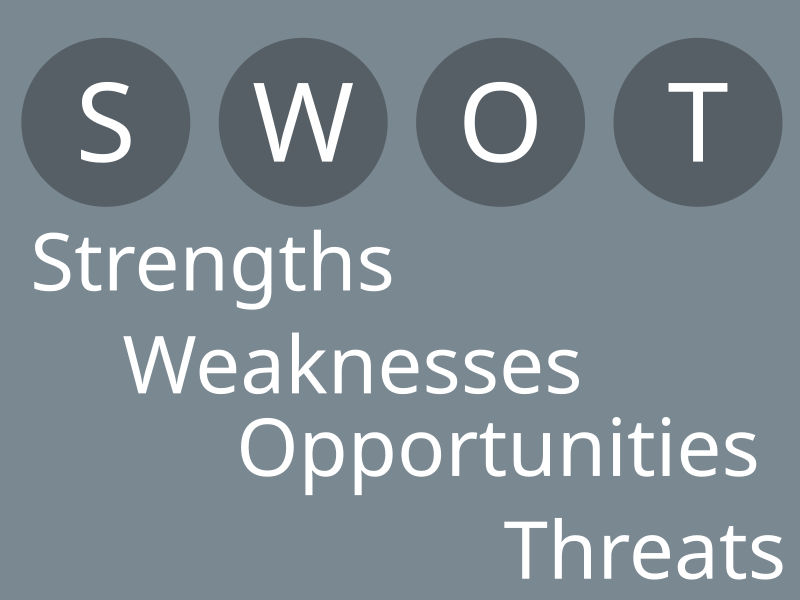SWOT analysis is a commonly used planning/management tool. It provides organizations a means to analyze their strengths, weaknesses, opportunities and threats. Each of these operational areas contribute to the organization's overall health and potential for growth.
Communities are complex organizations. Community planners often use a SWOT analysis in the development of community master plans. Leadership is always one area of analysis in the development of a SWOT for a city. Leadership, particularly elected leadership may be the most crucial determinant in the health, growth, and prosperity of a community. While this is true for all communities this is particularly critical for small communities. In understanding the roles and functions of municipal elected officials it may be helpful to view them through the SWOT lens. This paper is an attempt to examine elected leadership through this analysis methodology.
Strengths
The city council derives its power and authority as a council, a governmental body functioning as one in and for the best interests of the citizens of the community. Individual members of the council including the mayor have no governing power in a council - manager form of government. Functioning independently they have no ability to effect change, but functioning as a team they can guide the future of a community to economic and quality of life prosperity or bankruptcy. Council members who wish to be effective must build relationships with other members and learn to compromise when needed. Members must share the same overall vision for the community as well as a commitment to a common mission - working together to build a better city for future generations. A city council unified behind a clear vision and committed to the betterment of citizens of today and tomorrow can create a world class community.
Weaknesses
Unfortunately in the SWOT analysis of many communities, elected leadership is often found to be a weakness. Evidence of weaknesses in councils often can be seen in members who lack understanding of their roles and authority and their mission as elected leaders. Weak councils are typically split, because they choose to serve agendas of different factions within the city. This is a “critical weakness” because members elected to serve the entire community, instead serve only the primary interests of their constituency. Throughout my career I have heard council members state that they must do what the citizens ask them to do. I often wonder if they have spoken to “all” the citizens or if this is simply “code” for my friends telling me to take this stand.
Another weakness of councils, particularly in smaller communities is a tendency to ignore the stakeholders who have made larger investments in their communities, but live outside the city limits and therefore cannot vote. Often, these stakeholders are the sales tax generators and job creators. Some council members may not consider these stakeholders as citizens simply because they are unable to vote in municipal elections. This is extremely short-sighted as these business owners are primarily revenue generators for the city.
Systemic weakness in councils can often be found in the lack of internal leadership. If a council member or mayor understands the legislative role of the council and leads the rest of the council in that function, the council can be effective. However, if no member assumes a leadership role, and the council chooses to function as managers and fails to function as a legislative body the council will not be effective and the city will suffer.
Opportunities
Each election cycle affords a city with an opportunity at effective elected leadership. Council members seeking re-election have the ability to campaign on how they have worked with their colleagues to effect a shared vision for the community and helped to prepare the community to welcome and retain future generations with a robust economy and excellent quality of life. New candidates have the opportunity to challenge inflexible thinking and demonstrate a willingness to champion development for the better good.
Council members have opportunities at each meeting to demonstrate leadership through the analysis and decision making process. Councils should rely on staff for information related to the current and future operations needs of the city. Councils who have employed a professional city manager should allow them to function in that role, trusting their judgment and insight concerning the current and future needs of the city. Council members have the opportunity to demonstrate leadership as legislators, debating and choosing the best options for the future. They should refrain from using the opportunities presented in council meetings or workshops to attempt to micromanage the daily operations of the municipality.
Threats
The primary threat facing city councils is when members refuse to act in their role as a legislative body, but rather choose to act as city managers. In so doing council members assume a supervisory position over the daily operations of the city for their personal benefit or the benefit of their constituents. They may do this directly by ordering city employees to take certain actions, or indirectly by forcing the city manager to take action under political threat.
This “direct supervision” threat is compounded when council members have no willingness to learn their roles or take instruction from professionals, former council members, or agencies specializing in the training and development of elected officials. They assume that since they are elected officials they have sufficient knowledge to take independent action. They may think that since they are business owners, or may simply be long term residents of the community that they are inherently equipped to supervise the operations or some portion of the operations of the city.
Personal agendas constitute a critical threat to effective council leadership. Individuals seeking election to city council primarily to address one agenda item fail to consider the needs of the entire community. By focusing on one issue they limit their ability to work with others to establish the best priorities for the future of the community. Whether the issue be code enforcement, public safety, or getting rid of the city manager, the council member focused on the one issue has blinded themselves to the larger picture and is limiting their focus not only to one or two agenda items, but also only to present issues. If elected these members struggle to consider the significance of the impact of leadership on the future of the community. Council’s should be focused on decisions which have lasting impact - I often explain to council members that the basis of their decisions should not be their constituents, but their constituent’s grandchildren.
SWOT : Albert S. Humphrey, Stanford Research Institute, 1967
Craig Lindholm
ICMA-CM
August 2021





